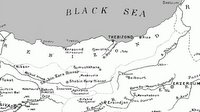Read this post only if you’re a linguistics geek like me…
 One of the more interesting elements of Bulutlari Beklerken (Waiting for the Clouds)—the film I saw with Joe and friends last Friday—was the use of Pontic Greek (Ποντιακά), the dialect spoken by the Greeks from the southern coast of the Black Sea (also referred to as Pontos/Trebizond, or Trabzon in Turkish). I had known about the existence of a Pontic Greek dialect, which evolved independently of the language spoken by the Greeks living in Greece and Western Asia Minor, but had never actually heard it spoken until last week. Because of its relative isolation, it is said to have preserved elements of ancient Greek. However, it is also generally recognized to have incorporated Turkish and Persian elements.
One of the more interesting elements of Bulutlari Beklerken (Waiting for the Clouds)—the film I saw with Joe and friends last Friday—was the use of Pontic Greek (Ποντιακά), the dialect spoken by the Greeks from the southern coast of the Black Sea (also referred to as Pontos/Trebizond, or Trabzon in Turkish). I had known about the existence of a Pontic Greek dialect, which evolved independently of the language spoken by the Greeks living in Greece and Western Asia Minor, but had never actually heard it spoken until last week. Because of its relative isolation, it is said to have preserved elements of ancient Greek. However, it is also generally recognized to have incorporated Turkish and Persian elements.Admittedly, it was difficult for me to understand, though there were times when I could make out some of the words. I decided to do a bit of poking around on the web and found some interesting resources.
There’s a great lexicon comparing Pontic Greek with Modern Greek (along with English translations) on Pontos.gr, a web portal for the Pontic Greek diaspora. The site is in Greek, but the lexicon is easy enough to figure out. Also, Wikipedia has some useful information on the historic evolution of Pontic Greek with some interesting grammatical analysis and comparison to ancient Greek. Finally, I found the entry for Pontic Greek on ethnologue, which is a really cool site in its own right.












8 Comments:
This was my fav. book while I was (not) studying Classics at University. Maybe it still is. Oh, and The Seven Pillars of Wisdom.
http://www.btinternet.com/~buckleburyweb/ade/sh.htm
sorry, here's the link
i didn't recognize the title at first, but as soon as i started reading the synopsis, i remember having read this. i liked it. i vaguely remember a gay subplot. what i remember most is the way the author portrayed the dreariness of the new england prep school in winter. a good read.
Fascinated by the info on Pontic Greek -- particularly the Wikipedia article. And yes... I AM a linguistics Geek (uh, Greek).
I'm actually working on a blog post that has a quotation you might like; one that has gotten me through..., well, "a lot":
(sic)
....I am a soldier, saith my heart,
and I have seen worse sights than this....
Good old Homer.....I might not have it right, but I do try, and will look it up. At least that's the "form" that I've always remembered it in, the one that has often "helped."
PS..great drawings on Persian Guys blog. Very nice.
Sometime I'll have to tell you about vomiting on the Oracle of Delphi.....it was a long bus ride from Athens, and by Corinth I was already a mess......
Makes me think of Québécois French, which evolved independently of the language in France, and so retains characteristics of 17th-century French... a friend who once visited St. Malo, in Normandy, told of elderly villagers who spoke in a way reminicent of Québécois.
Have also read about the Romance dialects of Corsica and Sardinia, which are similar (phonologically, lexicologically...) to northern Italian dialects of many centuries ago. Hmm.
And the other quotation on my mind tonight is one that I often think of, especially when I have indulged, or behaved in a way that some people might object to:
Pleasure only starts once the worm has got into the fruit, to become delightful happiness must be tainted with poison.
George Bataille (1897-1962)
Peter
too busy-
nice quotes. also, very interesting about quebecois and the corsican, sardegnian thing. i hadn't heard that, but it makes sense. in puglia and calabria in southern italy as well as parts of sicily, there are pockets of greek-speakers still who speak a dialect that is part greek (from the days of magna graecia??) and part italian. it's fascinating to hear.
I am also a linguistic geek, if you like that term. (I'm not sure I do, even if it is ironic.P) I am just back from t
Turkey, and I've spent months in Greece, so Pontic Greek, which I've heard of before, is suddenly fascinating. (I know something about the Calabrian, Apulian and Sicilian Greek, which probably comes not from Magna Graecia, but from the Byzantine outposts there.)
If there were not already two good translations of Cavafy, I would want to try to do one. As it is, my Turkish is not yet strong enough to translate poetry, though I can manage a newspaper well enough.
Post a Comment
<< Home